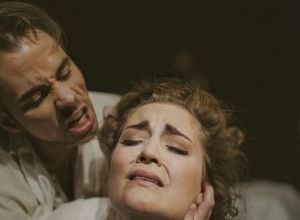Things to do
Opera review: All about the foreplay – rape’s aftermath a disappointment
This article is more than 8 years old.
★★★★

Well, you were warned, Lucretia (photo: Tine Sletting)
A harrowing, if short, tale of power, desire, and faith. This weekend the students of the Royal Danish Opera Academy brought the young opera to the stage.
Prologue
Two soldiers in military fatigues are on watch behind a huge net that separates the stage from the audience. Gunfire pops and explosions crack in the distance – one of the soldiers cradles her gun. It’s an image of comfort and despair. The play hinges upon this juxtaposition of security and imminent suffering, which is carried from this opening moment through the first act.
Men at camp
Adorned in vibrant red coats, Roman soldiers Junius (Joel Kyhle) and Tarquinius (Frederik Rolin) are drinking the night away lamenting their mutual misfortunes. Having discovered that their wives’ infidelities match their own, baritone Junius roars and chuckles, constantly baiting Tarquinius into conflict with him, much to the audience’s delight. It is unfortunate that these early moments of the play serve as some of the only bits of levity over the rest of the narrative.
Their comrade, the most righteous Collatinus (Joakim Larsson), is the only one who is spared from such grief as his wife Lucretia has remained chaste in his absence. This is, of course, his undoing as Tarquinius’s jealous and ravenous desire bids him to call upon Lucretia and tempt her.
In a momentous wave of vocal and orchestral power, Tarquinius steals away from the sleeping army camp to Rome, and to his grave and fateful destiny.
The rest is history, or her story, if you will. Lucretia is burdened with conveying much of the latter narrative. Which, to her credit the mesmerising and evocative Astrid Nordstad does with ease. The vocal talents of her maids, Miriam Alexandra Hoff and Cassandra Lemoine, are nothing to scoff at, but their contributions never elevate their roles to any level above background.
Arrival
Prince Tarquinius arrives in Rome and promptly makes for Lucretia’s home where he is greeted with uneasy charm from the maids and Lucretia herself. Not revealing his intentions, Tarquinious asks for a room to spend the night and the act winds to a close under the melodies of ‘Goodnight’.
Act II
The stage is dressed as Lucretia’s bedroom. A large bed surrounded by lit candles makes up a central picture of the stage. A not so subtle feature of the stage layout is the use of camouflage. The scrim and stage are covered in camouflage – which never truly allows the viewer to leave the warzone of opening scene. It is in this bedroom, and whilst Lucretia is fast asleep, that Tarquinius falls upon the vulnerable Lucretia. Waking to discover the crowned prince drunk and undressed in her room, Lucretia begs the prince to go, eventually drawing a knife and ordering him to return to sleep. Removing the blade from her hands the prince reacts with fury by throwing Lucretia to the ground and having his way with her.
Silence
The silence that preceded the rape was one of the truly authentic moments of the entire performance. Wrapped as I was in the stillness of the breathless audience, I found myself contemplating the endless tragedy of the tale played out before me.
Morning
But I was far too abruptly removed from that contemplation by the transition into morning. The events of the following day included the planting of flowers, the return of Collatinus, and the sudden death of Lucretia. Hardly had I recovered from the brutal sequences that opened the act, and our titular character was piercing her breast with a dagger and having a sheet thrown over her limp body.
Too short
Perhaps it is simply a failing of the script, but with so little time to really ruminate on the events, the characters were wholly unable to grieve for Lucretia. The music itself hugely outpaced these final moments of woe, forcing the act to come to an abrupt close. Though beautiful, the final arias left me dumbfounded and needing more time to understand how these events effected the characters.
What lacked in story arc was certainly recovered by sheer vocal talent, but it was hard to walk away without thinking of what could have been.










































